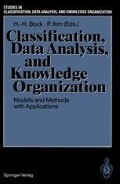Abstract
We analyze program data of a knowledge base encoded in Prolog. The aim is to classify the program clauses into rules and facts that are inconsistent, unfireable or unnecessary and those that pass without objections. Three complementary analysis steps are described and illustrated by small examples. We also discuss aspects of implementation and show how the original clauses have to be normalized in order to simplify processing. In the outlook it is indicated how the scope of the existing version will be expanded in the future.
Access this chapter
Tax calculation will be finalised at checkout
Purchases are for personal use only
Preview
Unable to display preview. Download preview PDF.
Bibliography
Appelrath, H.J. (1987): Das Eureka-Projekt PROTOS. In: Brauer, W., Wahlster, W. (eds.): Wissensbasierte Systeme. Proc. 2. Intl. GI-Kongress. Springer-Verlag, Heidelberg, 1–11.
Barachini, F., Adlassnig, K.-P. (1985): Überlegungen zur Konsistenztestproblematik von Wissensbasen am Beispiel des medizinischen Expertensystems CADIAG-1. In Trost, H., Retti, J. (eds.): Österreichische AI-Tagung, Springer-Verlag, Heidelberg, 1–8.
Brna, P., Bundy, A., Pain, H., Lynch, L. (1987): Programming Tools for Prolog Environments. In: Hallam, J., Mellish, C. (eds.): Advances in Artificial Intelligence. Proc. 1987 AISB Conference, Edinburgh, 251–264.
Clocksin, W.F., Mellish, C.S. (1987): Programming in Prolog (3rd ed.). Springer-Verlag, Heidelberg.
Debray, S.K., Warren, D.S. (1986): Detection and Optimization of Functional Computations in Prolog. In: Shapiro, E. (ed.): Third Intl. Conf. on Logic Programming. Springer-Verlag, Heidelberg, 490–504.
Geissman, J.R., Schultz, R.D. (1988): Verification & Validation of Expert Systems. AI Expert 2 26–33
Green, C.J.R., Keyes, M.M. (1987): Verification and Validation of Expert Systems. IEEE-Western Conference on Expert Systems, 38–43.
Hopcroft, J.E., Ullman, J.D. (1979): Introduction to Automata Theory, Languages and Computation. Addison-Wesley, Reading MA.
Kanamori, T., Seki, H. (1986): Verification of Prolog Programs Using An Extension of Execution. In: Shapiro, E. (ed.): Third Intl. Conf. on Logic Programming. Springer-Verlag, Heidelberg, 475–489.
Kleine Büning, H., Löwen, U., Schmitgen, S. (1988): Loop Detection in Propositional Prolog Programs. In: Börger, E., Kleine Büning, H., Richter, M.M. (eds.): CSL ′88. 2nd Workshop on Computer Science Logic, Springer-Verlag, Heidelberg, 148–165.
Knaus, R. (1988): Tracing Prolog. AI Expert, 11 17–23.
Knaus, R. (1989a): Expert Debugging Help. AI Expert, 7 19–24.
Knaus, R. (1989b): Debugging Help, Part Two. AI Expert, 9 27–31.
Lane, A. (1989): An End to Dueling Rules. Byte, June 1989, 303–308.
Nguyen, T.A. (1987): Verifying Consistency of Production Systems. In: IEEE Third Conference on Artificial Intelligence, 4–8.
Nilson, N.J. (1982): Principles of Artificial Intelligence. Springer-Verlag, Heidelberg.
Plumer, L. (1988): Predicate Inequalities as a Basis for Automated Termination Proofs for Prolog Programs. In: Börger, E., Kleine Büning, H., Richter, M.M. (eds.): CSL ′88. 2nd Workshop on Computer Science Logic, Springer-Verlag, Heidelberg, 254–271.
de Schreye, D., Bruynooghe, M., Verschaetse, K. (1989): On the Existence of Nonterminating Queries for a Restricted Class of PROLOG-Clauses. Artifical Intelligence, 41 237–248.
Takahashi, H., Shibayama, E. (1985): PRESET — A Debugging Environment for Prolog. In: Wada, E. (ed.): Logic Programming ′85. Proc. 4th Conference on Logic Programming, Springer-Verlag, Heidelberg, 90–100.
Ullman, J.D., van Geldern, A. (1988): Efficient Tests for Top-Down Termination of Logical Rules. J.ACM, 35 345–373.
Author information
Authors and Affiliations
Editor information
Editors and Affiliations
Rights and permissions
Copyright information
© 1991 Springer-Verlag Berlin · Heidelberg
About this paper
Cite this paper
Kiel, R., Schader, M. (1991). A Tool for Validating PROLOG Programs. In: Bock, HH., Ihm, P. (eds) Classification, Data Analysis, and Knowledge Organization. Studies in Classification, Data Analysis, and Knowledge Organization. Springer, Berlin, Heidelberg. https://doi.org/10.1007/978-3-642-76307-6_24
Download citation
DOI: https://doi.org/10.1007/978-3-642-76307-6_24
Publisher Name: Springer, Berlin, Heidelberg
Print ISBN: 978-3-540-53483-9
Online ISBN: 978-3-642-76307-6
eBook Packages: Springer Book Archive

